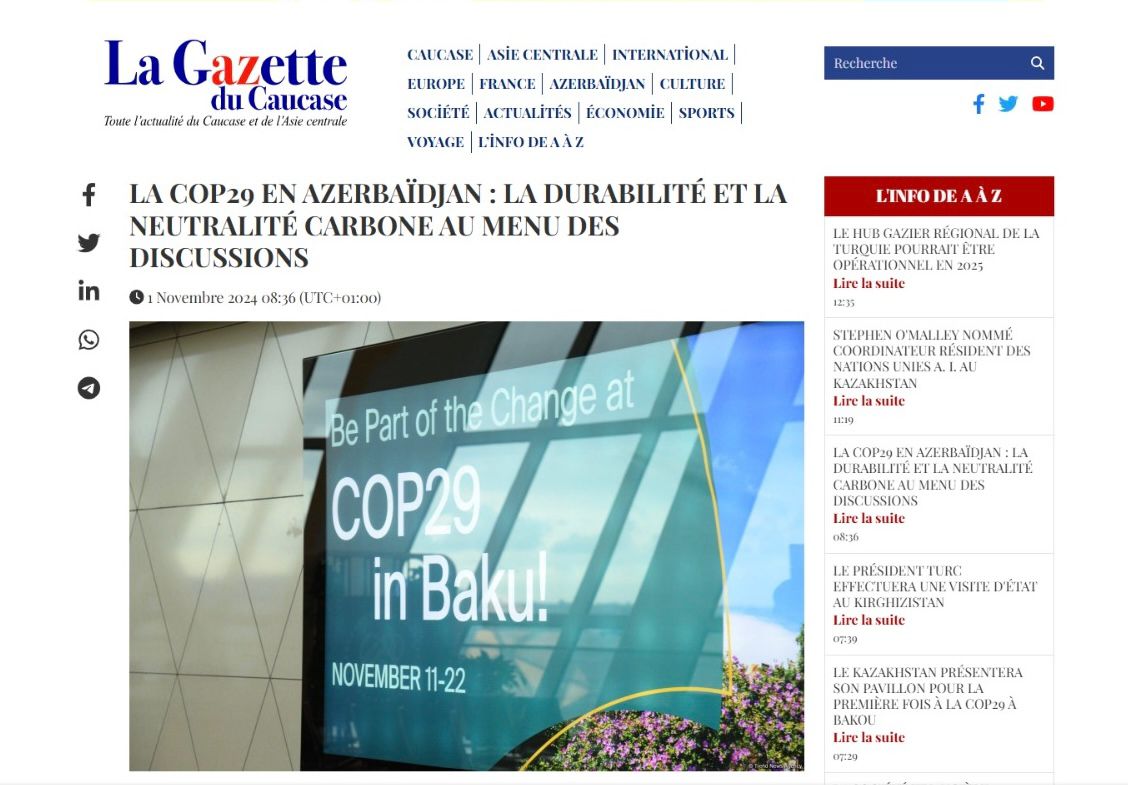BAKU, Azerbaijan, November 1. The upcoming COP29 offers Azerbaijan a unique opportunity to enhance its role in the global climate action movement, an article by the French online outlet La Gazette du Caucase reads, Trend reports.
"Within less than two weeks, Baku will host one of the world’s most important conferences—the twenty-ninth Conference of the Parties to the UN Framework Convention on Climate Change (COP29). While COP conferences are primarily organized under the auspices of the UN, the host countries play a crucial role in shaping the agenda. In this context, Azerbaijan has committed to meeting the requirements associated with hosting COP29," the article said.
The article also highlights that COP29 is fundamentally rooted in the principle of sustainable development.
"The goal of COP29 is to minimize carbon emissions during the conference, improve resource efficiency, promote renewable energy sources, and encourage sustainable practices. The aim is to conduct the event per the highest standards of environmental responsibility. The overarching goal of COP29 is to minimize negative environmental impacts while enhancing public engagement and promoting sustainable development and solidarity across all aspects of the event. Commitments to sustainability cover various areas, with a particular focus on achieving carbon neutrality. This includes reducing greenhouse gas emissions and attaining carbon neutrality through measures such as utilizing renewable energy sources, enhancing energy efficiency, and implementing emission offset strategies," the article added.
As mentioned, Azerbaijan signed the Paris Agreement, which supplements the UN Framework Convention on Climate Change, on April 22, 2016.
"In line with Article 4 of the agreement, Azerbaijan submitted its Nationally determined contributions (NDC) to the Convention's secretariat in October 2015. As part of its participation in global efforts to mitigate climate change, Azerbaijan plans to reduce its greenhouse gas emissions by 35 percent by 2030 compared to the 1990 levels. At COP26, held in Glasgow in 2021, Azerbaijan also committed to reducing climate change impacts by 40 percent by 2050," the article said.
The article highlights that the presidency of COP29 has developed a comprehensive strategy to achieve carbon neutrality, divided into three distinct phases.
"The first phase is the calculation stage, where the goal is to accurately measure, monitor, and report actual carbon emissions occurring during COP29 across all operational areas. This includes assessing direct (Scope 1), indirect (Scope 2), and supply chain-related (Scope 3) emissions. Such a systematic approach ensures transparency and allows targeted reductions of greenhouse gas emissions throughout the event.
The second phase focuses on neutrality, which encompasses three key aspects:
- Sustainable transportation: This includes providing COP29 participants with free metro access, creating new routes for micro-mobility, launching electric shuttles, and utilizing hybrid/electric taxis.
- Energy efficiency: This involves implementing energy-efficient lighting and equipment, employing energy management systems, and conducting regular energy audits at event venues.
- Renewable energy: Priority will be given to the use of renewable energy sources at COP29 venues, including hydrogenated vegetable oil (HVO) and purchasing renewable energy.
The final phase, termed offsetting, includes purchasing high-quality international carbon credits and supporting local initiatives aimed at mitigating climate change impacts in Azerbaijan," the article said.
The publication notes that the exploration of implementing a carbon tax in Azerbaijan is one of the effective global strategies for reducing carbon emissions.
"This method is gaining popularity on the international stage. The question on the agenda is: can carbon taxes be implemented in Azerbaijan? This topic has been under discussion for some time, particularly at the 5th Sustainable Development Goals Dialogue held at ADA University.
Azerbaijan's Deputy Minister of Economy, Samad Bashirli, remarked that until recently, carbon taxes were seldom mentioned or only considered in specific documents. However, this issue has now become a significant item on the national agenda," the article added.
"If all countries impose a carbon tax, we will have no choice but to follow suit," he said.
The Deputy Minister acknowledged that this initiative will inevitably affect the real sector, emphasizing the need for Azerbaijan to adapt to global economic realities.
Regarding the implementation of carbon taxes, Bashirli noted that while the concept may seem straightforward, it presents serious challenges.
"Considering our resources, it is clear what contributions we can make in the areas of finance, investment, and trade. However, these contributions need to be strengthened. Our resources are limited, requiring greater synergy among these areas. Although this may seem appealing, it is complex and requires mobilization of efforts at both the global and national levels," he explained.
Deputy Head of the State Tax Service under the Ministry of Economy of Azerbaijan Samira Musayeva also addressed the issue. She highlighted that the Azerbaijani government is actively discussing various scenarios for implementing carbon pricing with relevant institutions.
Musayeva stressed the importance of developing mechanisms for returning collected carbon taxes, especially to mitigate the impact of carbon emissions on households and small and medium enterprises within the framework of carbon pricing.
She pointed out that the primary goal of the tax is not revenue generation, but rather to stimulate investment in reducing carbon emissions, leading to decreased emissions and increased energy efficiency.
"The main task of carbon pricing is to tax high-emission sectors to encourage investments in low-emission and energy-efficient sectors. At the same time, it is essential to ensure a just transition by redistributing these funds among socially vulnerable groups and micro-entrepreneurs who may suffer from rising prices," she concluded.
"The discussions surrounding the potential implementation of carbon taxes further underline Azerbaijan's commitment to global efforts in reducing greenhouse gas emissions. The government recognizes the need for a balanced approach that fosters investment in low-emission technologies while supporting vulnerable communities affected by climate initiatives. Overall, COP29 presents Azerbaijan with a unique opportunity to strengthen its role in the global climate action movement," the French publication noted.







